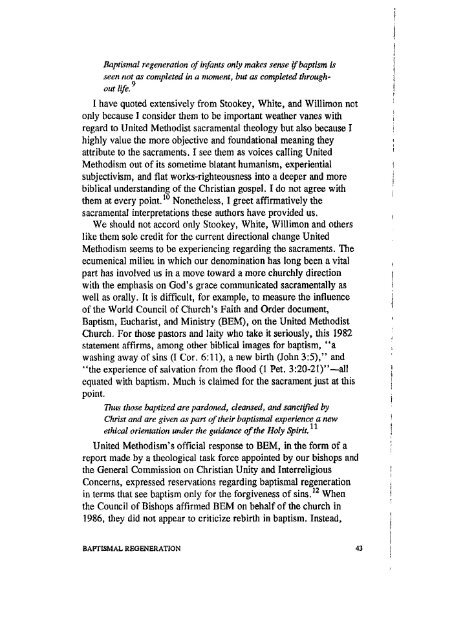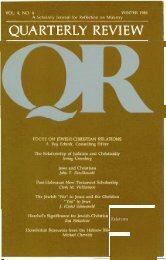TJieodore W. Jennings, Jr. The Meaning of ... - Quarterly Review
TJieodore W. Jennings, Jr. The Meaning of ... - Quarterly Review
TJieodore W. Jennings, Jr. The Meaning of ... - Quarterly Review
Create successful ePaper yourself
Turn your PDF publications into a flip-book with our unique Google optimized e-Paper software.
Baptismal regeneration <strong>of</strong> infants only makes sense if baptism is<br />
seen not as completed in a moment, but as completed throughout<br />
life. 9<br />
I have quoted extensively from Stookey, White, and Willimon not<br />
only because I consider them to be important weather vanes with<br />
regard to United Methodist sacramental theology but also because I<br />
highly value the more objective and foundational meaning they<br />
attribute to the sacraments. I see them as voices calling United<br />
Methodism out <strong>of</strong> its sometime blatant humanism, experiential<br />
subjectivism, and flat works-righteousness into a deeper and more<br />
biblical understanding <strong>of</strong> the Christian gospel. I do not agree with<br />
them at every point. 10<br />
Nonetheless, I greet affirmatively the<br />
sacramental interpretations these authors have provided us.<br />
We should not accord only Stookey, White, Willimon and others<br />
like them sole credit for the current directional change United<br />
Methodism seems to be experiencing regarding the sacraments. <strong>The</strong><br />
ecumenical milieu in which our denomination has long been a vital<br />
part has involved us in a move toward a more churchly direction<br />
with the emphasis on God's grace communicated sacramentally as<br />
well as orally. It is difficult, for example, to measure the influence<br />
<strong>of</strong> the World Council <strong>of</strong> Church's Faith and Order document,<br />
Baptism, Eucharist, and Ministry (BEM), on the United Methodist<br />
Church. For those pastors and laity who take it seriously, this 1982<br />
statement affirms, among other biblical images for baptism, "a<br />
washing away <strong>of</strong> sins (I Cor. 6:11), a new birth (John 3:5)," and<br />
"the experience <strong>of</strong> salvation from the flood (1 Pet. 3:20-21)"—all<br />
equated with baptism. Much is claimed for the sacrament just at this<br />
point.<br />
Thus those baptized are pardoned, cleansed, and sanctified by<br />
Christ and are given as part <strong>of</strong> their baptismal experience a new<br />
ethical orientation under the guidance <strong>of</strong> the Holy Spirit.<br />
United Methodism's <strong>of</strong>ficial response to BEM, in the form <strong>of</strong> a<br />
report made by a theological task force appointed by our bishops and<br />
the General Commission on Christian Unity and Interreligious<br />
Concerns, expressed reservations regarding baptismal regeneration<br />
in terms that see baptism only for the forgiveness <strong>of</strong> sins. 12<br />
When<br />
the Council <strong>of</strong> Bishops affirmed BEM on behalf <strong>of</strong> the church in<br />
1986, they did not appear to criticize rebirth in baptism. Instead,<br />
BAPTISMAL REGENERATION 43












